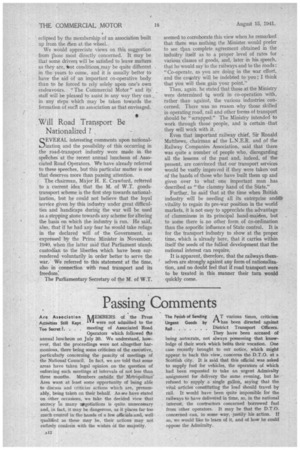Will Road Transport Be Nationalized ?
Page 14

If you've noticed an error in this article please click here to report it so we can fix it.
SEVERAL interesting comments upon nationalization and the possibility of this occurring in the road-transport industry were made in the speeches at the recent annual luncheon of Associated Road Operators. We have already referred to these speeches, but this particular matter is one that deserves more than passing attention.
The chairman, Major H. E. Crawfurd, referred to a current idea that the M. of W.T. goodstransport scheme is the first step towards nationalization, but he could not believe that the loyal service given by this industry under great difficulties and handicaps duririg the war will be used as a stepping stone towards any scheme for altering the basis an which the industry is run. He said, also, that if he had any fear he would take refuge in the declared will of the Government, as expressed by the Prime Minister in November, 1940, when the latter said that Parliament stands • custodian to the liberties which have been surrendered voluntarily in order better to serve the war.. We referred to this statement at the time, also in connection with road transport and its freedom: • The Parliamentary Secretary of the M. of W.T. seemed to corroborate this view when he remarked that there was nothing the Minister would prefer to see tlian complete agreement obtained in the industry itself as to a proper level of rates for various classes of goods, and, later in his speech, that he would say'to the railways and to the roads : "Cooperate, as you are doing in the war effort, and the cowtry will be indebted to you ; I think that you will then gain your point." Then, again, he stated that those at the Ministry were determined te_ work in co-operation with, rather than against, the various industries concerned. There was no reason why those skilled in operating road, rail and other forms of transport should be "scrapped." The Ministry intended to work. through those people, and is certain that they -will work with it. Even that important railway chief, Sir Ronald Matthews, chairman of the L.N.E.R. and of the Railway Companies Association, said that there was quite a number of people who, disregarding all the lessons of the past and, indeed, of the present, are convinced that our transport services would be vastly improved if they were taken out of the hands of those who have built them up and given over to what one important man has described as "the clammy hand of the State."
Further, he said that at the time when British industry will be needing all its enterprise and41110 vitality to regain its pre-war position in the world markets, it is not easy to apprecrate the advantage of clamminess in its principal hand-maiden, but to some there is no other form of co-ordination than the soporific influence of State control. It is for the transport industry to show at the proper time, which is already here, that it carries within itself the seeds of the fullest development that the national interest can require; It is apparent, therefore, that the railways themselves are strongly against any form of nationalization, and no doubt feel that if road transport were to be treated in this manner their turn would quickly come.
























































